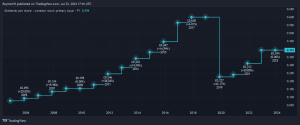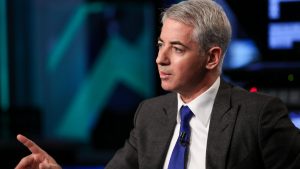Share this page:
The first ISA millionaire in the UK hit the million-pound mark only 16 years after investing his first pound. Lord Lee of Trafford turned £126,000 of ISA contributions into a million pounds by following some simple investing strategies.
With only six weeks left in the current tax year, you may be looking to invest in a stocks and shares ISA. So what can we learn from the investing secrets of the first ISA millionaire?
1. Invest in a stocks and shares ISA (not cash)
Lord Lee is no fan of Cash ISAs. He describes money “sitting there in the bank earning next to no interest” as a “great tragedy”. His ISA portfolio is based on “solid investments” in “fine UK companies”.
The statistics back up his view. According to IG, the FTSE 100 has delivered an annual return of nearly 8% in the last 35 years, easily beating cash returns.
2. Invest over the long term
Lord Lee holds investments for the long term, which is in line with our Foolish investing philosophy. He invested in PZ Cussons, owner of the Imperial Leather and Carex brands, in 1976.
Lord Lee believes “patience is the most important thing”. And he keeps faith in the recovery of companies if they hit a difficult patch.
Lord Lee also lets profits “run” rather than taking gains, holding shares for at least five years. However, he limits his downside risk by using a 20% stop-loss order (automatically sells shares if they drop below a set price).
3. Invest in ‘boring’ companies
Lord Lee has two main stock-picking criteria:
- Modestly valued companies: stocks with single-figure price to earnings ratios, demonstrating low market expectations about future growth.
- Attractive dividend yields: stocks with a track record of making good dividend payments. On his way to a million, he reinvested all dividends received, turning income into capital growth.
The dividend yields (dividend divided by share price) of his five largest holdings are:
|
Stock |
Forward dividend yield |
|
Air Partner |
2.0% |
|
Aviva |
4.9% |
|
Christie Group |
0.9% |
|
Concurrent Technologies |
3.0% |
|
Treatt |
0.8% |
Lord Lee invested in Nichols, the producer of Vimto, in 2002 when it was trading at a price to earnings ratio (PE) of 6.5 and a dividend yield of 9%. The company has since expanded internationally and is currently trading on a PE of 53, having more than doubled its share price since 2002.
Lord Lee also likes investing in companies with:
- Family representation on the board, together with a stable board that holds meaningful personal shareholdings
- A track record of stable profits
- Strong cash reserves and low debt
- A recognised brand
4. Balance your portfolio
So how many stocks does Lord Lee invest in? Around 35. But only in UK companies, preferably with international operations.
Roughly 25% of his portfolio is invested in small-caps below £50 million and 50% on AIM. Why? Because he views small-caps as “less well covered” with a greater opportunity to be “discovered”. However, he mitigates the risk of early-stage investing by increasing his shareholding gradually as the company grows.
Lord Lee believes small-caps are priced “correctly” only twice: on flotation and on takeover. Takeovers of Jarvis Hotels, Trust House Forte and Cheshire Whole Foods have boosted his gains.
5. Maximising ISA contributions
How did Lord Lee become the first ISA millionaire? By maxing out his annual allowances in those 16 years, investing over £120,000 in PEPs and ISAs.
His ISA pot grew by nearly £900,000, but he didn’t have to pay any capital gains tax on it. What’s more, he doesn’t pay income tax on the dividends either (and his ISA investments generate a six-figure annual income).
Making a regular contribution to a stocks and shares ISA can grow into a substantial nest egg. However, fees can make a surprising dent in the value of your portfolio, so it’s worth taking the time to look at our top-rated stocks and shares ISAs.
Investing lessons to take away
Lord Lee’s investing strategy is very similar to our Foolish philosophy. We believe in buying and holding quality stocks for a long period. We focus on company fundamentals over short-term price changes.
Lord Lee made his million by investing in relatively ‘boring’ companies on low PE ratios and solid dividend yields. This is certainly a very different strategy to the recent trend of investing in high-growth tech stocks trading on eye-watering PEs.
With fears over soaring inflation, rising interest rates and a possible recession, his investments in stable, defensive companies may be worth considering.
Was this article helpful?
YesNo
About the author
Jo is a writer specialising in personal finance and investments. She is a qualified Chartered Accountant, previously working in M&A at a UK investment bank and Arthur Andersen. Jo has written on a range of subjects, from in… Read More
Share this page:
Some offers on The Motley Fool UK site are from our partners — it’s how we make money and keep this site going. But does that impact our ratings? Nope. Our commitment is to you. If a product isn’t any good, our rating will reflect that, or we won’t list it at all. Also, while we aim to feature the best products available, we do not review every product on the market. Learn more here. The statements above are The Motley Fool’s alone and have not been provided or endorsed by bank advertisers. John Mackey, CEO of Whole Foods Market, an Amazon subsidiary, is a member of The Motley Fool’s board of directors. The Motley Fool UK has recommended Barclays, Hargreaves Lansdown, HSBC Holdings, Lloyds Banking Group, Mastercard, and Tesco.
This post was originally published on Motley Fool







